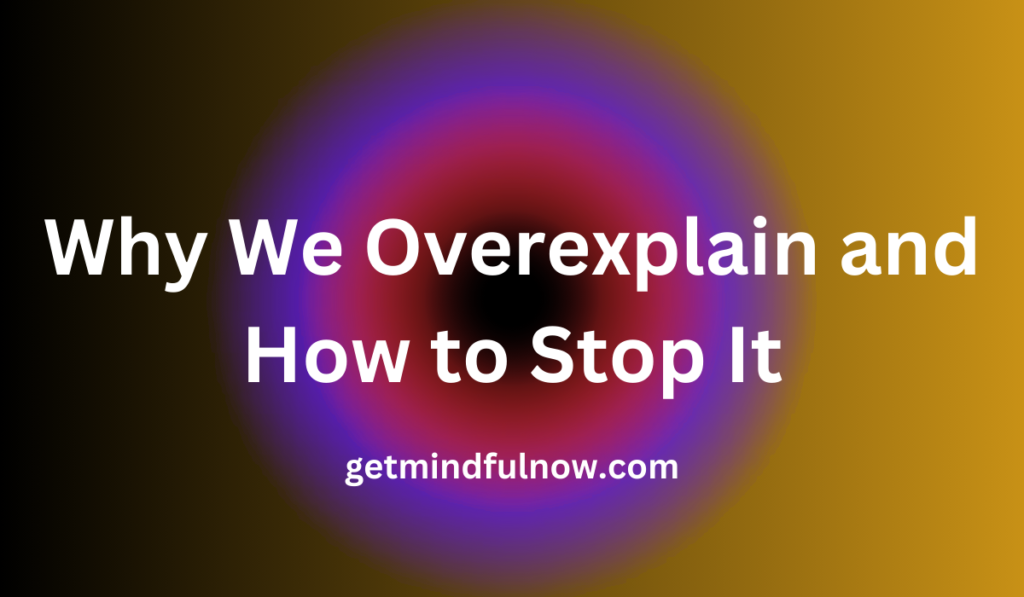I always felt an urge to keep talking on a topic without pausing for a second, whether I was on a call or having a face-to-face conversation.
People noticed my anxiety while speaking; sometimes, it escalated to the point where I’d keep explaining something, ignoring my cooling coffee or even the need to use the restroom. I avoided breaking the flow of my monologue, wanting to completely express what was on my mind.
If you’ve experienced something similar, stick around for this post. I’ll uncover the real reason behind it and share how I learned to stop over-explaining all the time.
In the end, I’ll also share my personal story, explaining why I used to behave this way. Let’s dive in.
Table of Contents
Introduction to Overexplaining
Overexplaining, a common habit in communication, often stems from a desire to be understood thoroughly.
It involves providing excessive details or context when explaining a point, sometimes leading to a loss of clarity.
Understanding the Reasons Behind Overexplaining
Psychological and Social Factors
One primary reason for overexplaining lies in psychological tendencies. This is called fawn in psychology.
During childhood, a child might learn to keep every authority figure at home pleased to ensure their physical or emotional safety.
Growing up in an uncertain environment can disrupt our body’s balance and easily trigger stress responses.
When our bodies go into fight or flight mode, we might feel compelled to overexplain out of fear of being misunderstood or not being heard properly.
We often find ourselves speaking unnecessarily and saying sentences like ‘I’m sorry I did that because…’ and continue speaking.
This behavior could stem from childhood neglect. When a child sees that nobody is listening to them, providing validation, or sometimes accusing them for wrong reasons, they tend to over-explain.
Additionally, societal pressures can contribute to this habit, especially in contexts where validation through extensive explanation is expected.
Gaslighting
When someone encounters a toxic relationship with a manipulator, their response might be to over-explain, ensuring there’s no room left for any distortion in words.
Impact of Overexplaining
The consequences of overexplaining can be significant. It often leads to a breakdown in communication, as the core message can get lost amidst the surplus information.
We often find ourselves triggered when people misunderstand what we’re saying or when we work extra hard to explain our perspective so our loved ones understand where we’re coming from. There’s a high chance that, while growing up, we were shamed, criticized, or ridiculed by authority figures who never cared to hear our side of the story.
This habit consumes unnecessary time and energy, both for the speaker and the listener.
We might feel that we don’t have any control over stopping ourselves, which leads to:
- Feeling regretful afterward
- Providing way too much information than necessary
- Feeling a sense of responsibility to make others agree
- Experiencing deep guilt for simple requests, such as asking for a leave
- Feeling left out if the listener interrupts us in the middle.
Strategies to Avoid Overexplaining
To combat this habit, employing active listening techniques proves crucial. It involves being attentive to the listener’s response and adjusting the explanation accordingly.
We must let go of the belief that people will dislike us if we don’t provide extra explanations. In reality, the opposite often occurs as people appreciate concise answers.
Try offering brief responses and practice resisting the urge to over-explain. This practice helps in boosting confidence.
Examples of one-line answers are
- “Maybe, but it’s uncertain.”
- “No, it won’t work.”
- “Possibly, given the circumstances.”
- “Definitely not.”
- “Absolutely, without a doubt.”
- “It’s likely, based on current trends.
Recognize that people can handle disappointment; it’s a part of human learning. You don’t need to monitor their emotions or alter your behavior to shield them from feeling bad.
Trust that others are capable of asking for more information if needed.
Be authentic to yourself. Ensure your words and feelings are aligned.
12 Ways to Stop Over-Explaining
Setting Boundaries
Determine the extent of information needed in a conversation. For instance, in a work meeting, decide beforehand the level of detail required and stick to it, avoiding unnecessary elaboration.
Learn your “Over-Explaining Triggers”
Recognize patterns in conversations. If you notice yourself overexplaining when discussing personal matters with certain individuals, acknowledge this trigger and work on curtailing excessive information.
Understand that You Don’t Need to Be a People Pleaser
Realize that overexplaining often stems from a desire to please or seek approval. In situations where you feel the urge to explain excessively to gain acceptance, remind yourself that it’s okay not to seek validation through over-explanation.
You Don’t Owe an Explanation
In scenarios where your decision doesn’t impact others directly, like personal preferences, it’s fine not to provide detailed reasons for your choices. For instance, if someone questions your food preferences, a simple “I prefer this” suffices without needing extensive justification.
It is Fine to Be Misunderstood
Accept that not everyone will comprehend your perspective entirely. In discussions where viewpoints differ, acknowledge that being misunderstood doesn’t invalidate your stance.
Trust Yourself
Have confidence in your knowledge and expertise. When discussing familiar topics, refrain from overexplaining due to self-doubt. Trust that your insights are valuable without excessive elaboration.
Create and celebrate your boundaries
Establish clear communication boundaries in conversations. For instance, in professional settings, celebrate maintaining concise and effective communication without feeling the need to overexplain.
The Appreciation + the no + well wishes method of Psychologist Dr LePera
Employ a method where you express appreciation for the other person’s perspective, politely decline unnecessary explanations, and offer well wishes. For example, “I can’t make it to the party this Saturday, I have plans and I appreciate you inviting me!”
Think Before You Speak
Take a moment to consider the necessity of the information before sharing it. In casual conversations, pause and assess if the additional details are crucial to convey your point effectively.
Ask a Question Between Conversation
Break the cycle of over-explanation by inserting questions to redirect the conversation. For instance, if you notice yourself elaborating extensively, pivot by asking the other person a relevant question to engage them.
Embrace Silence or Gaps in Conversation
Understand that pauses or silences in discussions are natural. Embrace these moments without feeling the urge to fill them with excessive information.
Practice Stillness
Incorporate mindfulness techniques to stay present in conversations. Practice deep breathing or grounding techniques to maintain composure and avoid overexplaining due to nervousness or anxiety.
The Art of Concise Communication
Mastering the art of concise communication is key. Utilizing techniques like summarizing key points, using analogies or metaphors, and structuring information effectively aids in clear expression without overexplaining.
Personal Story: Navigating Overexplaining
In the beginning, I mentioned my chronic habit of over-explaining things. My journey was particularly challenging due to a fawn trauma response.
I grew up with my mother, who exhibits a wide range of personality disorders (I realize this now, being a psychologist myself). She never listened to me attentively, and whenever I tried to convey something important, she would distract herself with multiple tasks as if compelled to do so.
If, by chance, I managed to make her listen for a moment, she’d glance at the clock and insinuate it was making her late for doing nothing at all.
Responding to anything became anxiety-inducing for me. I’d compose unnecessarily long texts and voice messages for everyone.
After getting married and no longer living with my mother, I noticed a pattern. During conversations with my partner, I monopolized the conversation, leaving little room for their input.
Eventually, I’d notice a hint of annoyance on their face. It reinforced the pain I felt each time my mother misunderstood me or left me unheard.
My partner reassured me repeatedly, yet I still turned every discussion into a conflict, feeling victimized by being misunderstood. It wasn’t until I began the deep work of healing long-held traumas that I saw a change.
There are other resources available on this topic but to me, this topic is like a personal experience. It took me a lot of patience with myself until I started feeling less needful to over-explain.
Conclusion
In conclusion, understanding the triggers behind overexplaining and adopting strategies to counteract this habit are pivotal for effective communication. Embracing concise and clear communication methods ensures that the message is conveyed efficiently without unnecessary elaboration.
I hope this has helped you in gaining a deep understanding of over-explaining and how to stop it. Share your experience in the comments and I would love to talk back without over-explaining….
FAQs
- Is overexplaining the same as providing necessary details? Overexplaining involves unnecessary elaboration while providing necessary details is about ensuring clarity without overwhelming the listener.
- How can one recognize if they tend to overexplain? A tendency to receive feedback on being too detailed or noticing listeners’ disinterest can indicate a habit of overexplaining.
- Can overexplaining be unlearned? Yes, with conscious effort, one can unlearn the habit by practicing concise communication and active listening.
- Does overexplaining affect professional communication? Excessive explanations can impact professional interactions, potentially leading to misunderstandings or consuming excessive time in meetings.
- Are there cultural differences in overexplaining? Cultural norms may influence the extent of explanation expected, but the habit itself transcends cultural boundaries.






Great Work keep doing it!
Its informative!
Maybe I have found a reason for my behavior.
Keep doing the work.
Thanks, I have explained the topic in depth in another blog. Do share your thoughts on that.